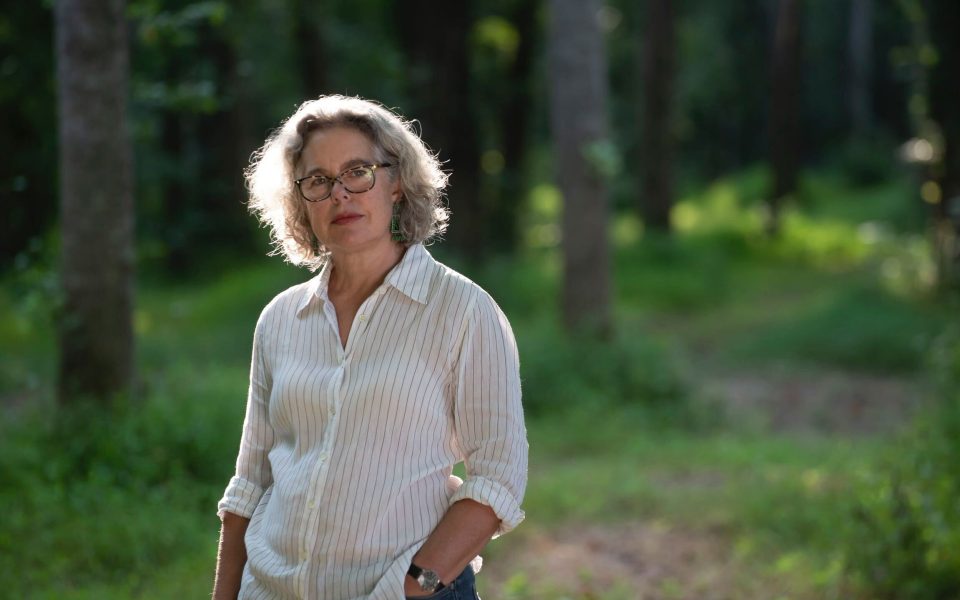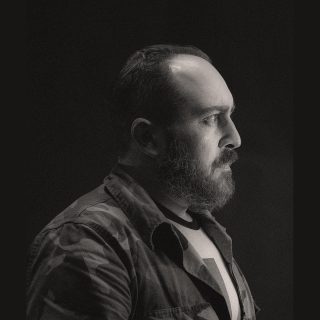Featured photo: When Phoebe Zerwick was a metro columnist for the Winston-Salem Journal, she wrote an eight-part series that acted as a catalyst for renewed investigation into the case of Darryl Hunt, a Black man who was falsely accused and imprisoned for the rape and murder of a white woman in 1984. (photo by Christine Rucker)
Phoebe Zerwick is the Associate Director of the Practice within the English Department and Director of the Journalism Program at Wake Forest University in Winston-Salem. As a former metro columnist for the Winston-Salem Journal, Zerwick wrote an eight-part series in 2003 that delved into the 1984 murder of Deborah Sykes who, like Zerwick, had chosen a career in journalism. The 25-year-old Sykes, who was employed for the Winston-Salem Sentinel as a copy editor, was raped and stabbed to death while walking to work in downtown Winston-Salem on the morning of Aug. 10, 1984. The man convicted of her rape and murder, Darryl Hunt, was sentenced to life in prison.
Zerwick’s series of articles Murder, Race, Justice: The State vs. Darryl Hunt, was a catalyst for a renewed investigation into the case. The subsequent events led to DNA testing that implicated another suspect who, when confronted, admitted to the crime. Darryl Hunt, who always maintained his innocence, was exonerated and released in early 2004 after serving almost 20 years. He died in 2016 from a self-inflicted gunshot wound.
Zerwick’s first book, Beyond Innocence: The Life Sentence of Darryl Hunt is set to be released on March 8. Zerwick will also be speaking at Bookmarks in Winston-Salem on March 8 at 7 p.m.

When did you first learn of Darryl Hunt?
I kind of grew up as a journalist knowing his story, but I investigated the case for the Winston-Salem Journal in 2003. I kind of thought I was done when he got out. When he died, I was drawn back into trying to find out what had happened to him, trying to find out the real story that I had missed earlier. The story of what happened to him in prison and the challenges he faced coming out of prison.
How did you come up with the focus for the book?
There’s an archive at the Wake Forest law school of all the court pleadings related to his case, correspondence related to his case, letters back and forth between him and his attorney, and journals that were made available to me. So, the real research and reporting that went into the book was trying to understand how this injustice affected Darryl psychologically and trying to understand what happened to him in prison. And then, really trying to understand what his life was like after prison.
What did you find out about how Darryl’s life was after he was released?
What he really wanted to work on was helping people coming home from prison. He ran a foundation called the Darryl Hunt Project for Freedom and Justice and did a lot of that work himself. He did lots and lots of mentoring work. What he understood was that there are so many barriers in place and that it wasn’t that he felt the work he was doing was futile, but it was more than one small agency can tackle.
The kinds of barriers he talked about have since been documented by the American Bar Association. Regulations, laws, guidelines, all kinds of practices that pretty much condemn people coming out of prison to fail. It’s impossible to get a job. You can’t go live in public housing. You can’t apply for financial aid. Some places you can’t even get a license to be a barber, you certainly can’t become a lawyer. You can’t serve on a jury. Lots of places still don’t allow anybody with a criminal record to vote. Getting insurance can be really difficult.
So there are all these structural barriers that these reentry programs — which provide a little bit of job training, a little bit of help getting housing, maybe a little bit of help getting a car — just provide a band aid. It’s not addressing this larger problem that Darryl really wanted to address.
What did your reporting find about the trauma caused by people who are wrongly convicted like Darryl was?
There haven’t been a lot of studies of people who were exonerated, but the ones that have been done show that Darryl Hunt was not at all alone and suffered tremendous trauma and psychiatric issues from this experience.
People exonerated from death row all report some form of trauma: drug abuse, alcohol abuse, difficulty maintaining relationships. All of these problems are what people typically associate with PTSD. I don’t know that Darrell was ever diagnosed with PTSD, he had the symptoms of PTSD. He had panic attacks, he couldn’t sleep, he went to the ATM every day to have a document of where he was in case he was ever accused of something again.
It was the experience of being in prison and having these repeated defeats and repeated experiences of injustice. Darryl was twice convicted of the murder of Deborah Sykes. Then there was another murder that he was charged with, the death of Arthur Wilson, which he was convicted and then acquitted of. So, that’s four murder trials to go through and then he was turned down by the appellate system at every single level. There was DNA evidence in 1994 that showed he had not raped Deborah Sykes. That should have won a new trial or exonerated him. Instead, he was turned down by the local courts, by the state Supreme Court, by the Federal Court of Appeals, and then by the US Supreme Court. All of those defeats.
In researching this book, I came to understand better how devastating those were. He came out of prison. and he immediately began the life of a celebrity. There was a documentary film about him that elevated him even more as a celebrity. Then, he did all this advocacy work. In a sense, what he was doing was reliving this trauma every day as part of his job. And there’s a term for it, people call it “cumulative trauma.”
These exonerations have kind of become a normal part of the news. Somewhere, somebody is getting out of prison, and it looks like a victory and people say “Well, the criminal justice system worked” and that the release is the end of it. It’s beginning to work, but it’s certainly not achieving justice.
How has learning about and reporting about Darryl Hunt affected you personally?
It makes me sad. Today would have been his birthday. I suppose I have very complicated feelings about it. Darryl should have been the one to get to write his book.
Darryl Hunt was born on Feb. 24, 1965, in Winston-Salem. He died on March 13, 2016.
Join the First Amendment Society, a membership that goes directly to funding TCB‘s newsroom.
We believe that reporting can save the world.
The TCB First Amendment Society recognizes the vital role of a free, unfettered press with a bundling of local experiences designed to build community, and unique engagements with our newsroom that will help you understand, and shape, local journalism’s critical role in uplifting the people in our cities.
All revenue goes directly into the newsroom as reporters’ salaries and freelance commissions.


Leave a Reply